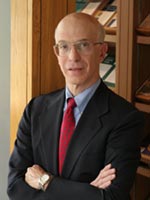Main navigation
 Alan Blinder is the Gordon S. Rentschler Memorial Professor of Economics and Public Affairs at Princeton University. In the 1990s, he served in President Clinton's Council of Economic Advisers and then as Vice Chairman of the Board of Governors of the Federal Reserve System. Currently a Visiting Scholar at the Russell Sage Foundation, Dr. Blinder is writing a historical analysis of the 2007-08 financial crisis and the Great Recession.
Alan Blinder is the Gordon S. Rentschler Memorial Professor of Economics and Public Affairs at Princeton University. In the 1990s, he served in President Clinton's Council of Economic Advisers and then as Vice Chairman of the Board of Governors of the Federal Reserve System. Currently a Visiting Scholar at the Russell Sage Foundation, Dr. Blinder is writing a historical analysis of the 2007-08 financial crisis and the Great Recession.
Q: What is your overall assessment of what economists know about the financial sector? Which area needs more research? Did economics, as Larry Summers recently said, fail to keep with the fact that "asset prices show large volatility that don’t always reflect fundamentals"?
A: I don’t think Summers is right. Many of us had viewed asset prices as excessively volatile for a long, long time—dating back at least to Bob Shiller’s famous papers of 30 years ago.
Do we know enough about the financial sector? Well, I guess there’s never enough knowledge, and more research is always needed. But at least some economists know quite a lot. One big problem, however, going into 2007 was that too many of the economists who were most knowledgeable about the financial system were too imbued with the dominant intellectual paradigm—the efficient markets hypothesis—and too sympathetic to the alleged benefits of derivatives.
Q: Which economists or experts have proven useful for your study of the financial crisis? Do you think Hyman Minksy’s ‘financial instability hypothesis’ deserves more careful study now?
A: Yes, I think it’s a crying shame that more of us (myself included) didn’t pay more attention to Minsky. He had so much right, but he didn’t speak in the mathematical-modeling language that dominates economics. So too few of us paid attention.
I’ve learned a lot about the financial crisis from any number of economists (the Squam Lake Group is a good place to start, as are Reinhart and Rogoff), but also from some several astute journalists. It’s quite a story. But I don’t think there is yet a comprehensive, analytical look at what happened—a real economic history of the period. I’m trying to write that here at RSF.
In this 2008 video, recorded at Princeton University, Dr. Blinder discusses the financial crisis.
Q: We are now facing another round of bleak economic forecasts, with many predicting a return to full employment only in 2015. Some economists – most famously, Carmen Reinhart and Kenneth Rogoff in This Time Will Be Different – have said this comports with research that shows post-financial bust recoveries take longer. Do you think that explains the slow growth?
A: I think it’s part of the story for sure, maybe a big part. But so are inadequate policy responses. One example: we’ve allowed the foreclosure problem to fester. Another example: Once the Federal Reserve ran its policy interest rate down to about zero, it was left with much weaker instruments. In a higher interest rate environment, the Fed would have done more.
Q: In a recent piece, Ezra Klein of the Washington Post reviewed the decisions made in Washington since 2009 and asked what – if anything – could have been done to prevent unemployment from reaching 9 percent, and staying there, for so long. What do you think – could this time really have been different?
A: Once Lehman Brothers failed, I think holding the unemployment rate below 9% would have taken an extraordinary combination of bold, quick policy interventions and good luck. By the time President Obama took over, it was pretty much too late. The key question is whether we would have had a far less severe recession if Lehman had been saved. I think so, but not everyone agrees.
Q: Scott Sumner, an economist at Bentley, has argued the economic crisis has “not only overwhelmed the Fed’s inflation-targeting methods, but showed them to be deeply inadequate.” What has this crisis taught you about the use and value of monetary policy?
A: The lessons here go on and on, but the inadequacy of inflation-targeting is not obviously one of them. Many of us knew (or believed) this before, and therefore favored the Fed’s dual mandate. I think we have learned (a) that the Fed has many more monetary policy instruments than just the federal funds rate, but (b) (as mentioned earlier) that these instruments just aren’t as powerful as the funds rate. We’re still learning about their quantitative impacts.





